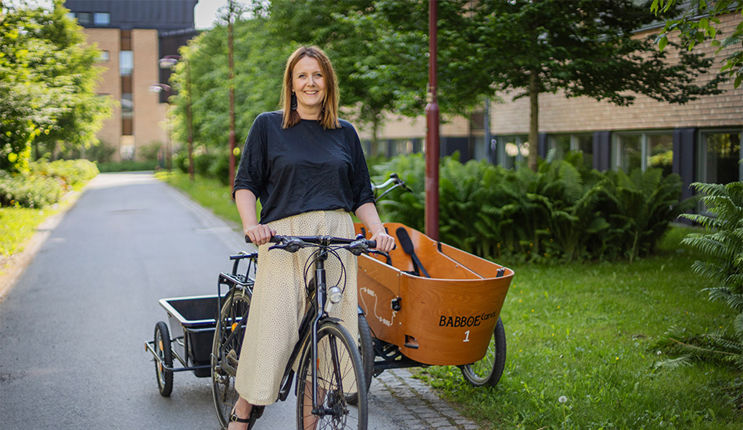
Innovative daily travel for the future - At Tomtebo Strand, the daily puzzle becomes sustainable
Jessika Lagrelius and her then-husband sold their car in 2018. The idea had been on their minds for a while, but when the car broke down just as a frightening IPCC report was released, it prompted them to take action.
–It was the realization that climate change is happening now that pushed me to agree to sell the car, says Jessika.
The family took the plunge, and they haven’t regretted it.
–Car ownership is a constant hassle,” says Jessika. “You’re always worrying about costs. Is it worth fixing the car? It’s also inconvenient with tasks like changing tires and washing the car.
Jessika and her ex-husband Johan pondered for a long time how they would manage daily life without a car, considering shopping, vacations, children's sports activities, visiting friends, and more.
–There are challenges to not owning a car. One of the biggest was transporting kids to sports practices—you can’t fit four boys on a scooter when it’s your turn to drive. Getting to the ski slope and the beach in summer is also challenging. The car is both an ultimate and a worthless solution. It’s parked in my driveway and solves all transport needs quickly. The problem is it’s the worst from a climate perspective.
Jessika's family resolved the issue by joining a carpool in Carlshöjd, not far from their home in Sofiehem. Even now, after their separation, both Jessika and Johan are still members of the carpool, using the car when absolutely necessary, usually for transporting the kids. (The fact that the children no longer play team sports has made things easier.) The children find it manageable not to have a car, though it can be inconvenient at times.
–I think it works well that we don’t have our own car. We have the carpool, which we don’t use very much. Sometimes I get rides from friends’ parents, for example to Bräntberget, and sometimes mom and dad drive me,” says the family's 14-year-old.
–It works well, but it’s a bit tricky because you can’t just leave immediately. You have to arrange things first, it’s not just about heading out. And sometimes no car is available, says the 16-year-old.
The Lagrelius family has also tried other solutions for their transport needs, such as a bike pool membership, cargo bikes, and home-delivered groceries. Johan is also considering leasing an electric bike through work.
Jessika appreciates that her total car expenses are now around 1,000 SEK per month, significantly less than the cost of owning a car. Keeping track of expenses is easier, which is a positive aspect. Additional benefits include more daily exercise and a sense of contributing to the environment.
–We are ordinary people with an interest in the environment and climate. I’m quite comfortable by nature, but still manage to make it work. I’m not going back to owning a car. We’ve tried to adapt, and I want to be able to tell my children that I did what I could.
Passenger car traffic accounts for about ten percent of Europe’s total emissions, and reducing usage can greatly benefit local air quality, congestion, and the global climate. At Tomtebo Strand, the goal is to make it as easy as possible to choose alternative transportation over owning a car.
–At Tomtebo Strand, we are planning to make sustainable travel choices easy and convenient. There will be heated bike garages near the homes, frequent bus services, a carpool, sharing services for bikes, e-bikes, and cargo bikes, and a bike workshop. The idea is for all these services to be available in a shared hub,” explains Magdalena Blomquist from Umeå Municipality, who is responsible for the detailed planning at Tomtebo Strand.
–We also aim to reduce the need for travel. At Tomtebo Strand, most of what people need will be nearby. For example, we plan to include delivery boxes for parcels and groceries. The major challenge is to reduce car dependency. Giving up the car is a big step— for many, it’s the way they manage their transport needs,” says Magdalena Blomquist.
Monthly Car Costs
Monthly cost based on 10-year depreciation
VW Golf 110 TSI MAN, petrol
Depreciation: 2,233 SEK Service (estimate): 200 SEK
Vehicle tax: 245 SEK
Fuel cost: 1,350 SEK*
Total: 4,028 SEK
Insurance, potential extra equipment, and wear and tear costs are not included and are additional to the above amount.
*Calculated based on 15,000 km/year, petrol at 20 SEK/liter, and declared consumption for mixed driving according to WLTP. Source: Miljöfordon Sverige
Quick Facts about Tomtebo Strand
One of the largest housing projects in Umeå with up to 3,000 homes and 70,000 square meters of commercial space. Located next to one of Umeå’s largest and most dynamic work areas, the University City, and one of the most important recreational areas—Nydala. And only four kilometers from the city center. Size-wise, approximately 60 hectares—the same area as Umeå’s city center square. Tomtebo Strand is a collaborative project between Umeå Municipality, HSB, NCC, PEAB, Riksbyggen, Rikshem, Skanska, Slättö, Umeå Energi, and Vakin.